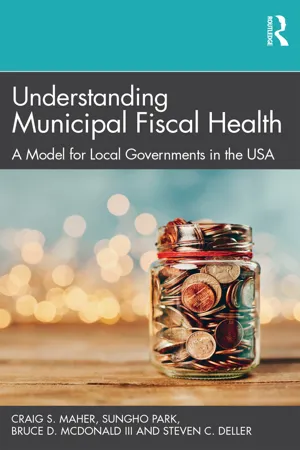
Understanding Municipal Fiscal Health
A Model for Local Governments in the USA
- 330 pages
- English
- ePUB (mobile friendly)
- Available on iOS & Android
Understanding Municipal Fiscal Health
A Model for Local Governments in the USA
About This Book
Understanding Municipal Fiscal Health provides an in-depth assessment of the fiscal health of cities throughout the United States.
The book examines the tools currently available to cities for designing a revenue structure, measuring fiscal conditions and measuring fiscal health. It explains how artificial policies such as tax and expenditure limitations influence fiscal policies, and how communities can overcome socioeconomic and state-policy barriers to produce strong fiscal conditions. The authors go beyond simple theory to analyze patterns of fiscal health using actual financial, demographic and TEL data from an accurate data source, the Government Financial Officers Association survey. The book offers a solid basis of empirical evidence including quantitative case studies—complete with discussion questions—to help practitioners better understand the environment in which they are functioning and the policy tools they need to help advocate for change.
This book teaches the reader the science and art of municipal financial analysis, and will be invaluable for local and state officials, analysts, and students and researchers.
Frequently asked questions
Information
Table of contents
- Cover
- Endorsements
- Half Title
- Title
- Copyright
- Dedication
- Contents
- List of Figures
- List of Tables
- Author Biographies
- Acknowledgments
- 1 Introduction
- 2 Inputs: Municipal Fiscal Environments
- 3 Outputs: Municipal Fiscal Trends
- 4 Outcomes: Measuring Fiscal Health
- 5 Outcomes: Measuring Fiscal Stress
- 6 Outcomes: Municipal Fiscal Condition Trends
- 7 Policy Actions: Municipal Responses to Fiscal Stress
- 8 Policy Actions: State Responses to Municipal Fiscal Stress
- 9 Case Study of Flint, Michigan
- 10 Case Study of Wichita, Kansas
- 11 Case Study of North Lauderdale, Florida
- 12 Case Study of Havelock, North Carolina
- 13 Case Study of Commerce, California
- 14 Academic and Professional Approaches to Financial Condition Analysis
- 15 Conclusions and Lessons Learned
- Appendix A: Pros and Cons of the Census Bureau’s Survey of State and Local Government Finances
- Appendix B: Selected Benchmarks
- Bibliography
- Index